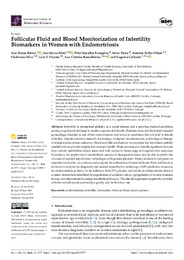Por favor, use este identificador para citar o enlazar este ítem:
https://hdl.handle.net/11000/32543Registro completo de metadatos
| Campo DC | Valor | Lengua/Idioma |
|---|---|---|
| dc.contributor.author | Brinca, Ana Teresa | - |
| dc.contributor.author | Peiró, Ana | - |
| dc.contributor.author | MATALLIN EVANGELIO, PILAR | - |
| dc.contributor.author | Eleno, Irene | - |
| dc.contributor.other | Departamentos de la UMH::Farmacología, Pediatría y Química Orgánica | es_ES |
| dc.date.accessioned | 2024-07-18T10:09:00Z | - |
| dc.date.available | 2024-07-18T10:09:00Z | - |
| dc.date.created | 2024-06-29 | - |
| dc.identifier.citation | Int. J. Mol. Sci. 2024, 25, 7177 | es_ES |
| dc.identifier.issn | 1422-0067 | - |
| dc.identifier.uri | https://hdl.handle.net/11000/32543 | - |
| dc.description.abstract | Infertility is recognized globally as a social disease and a growing medical condition, posing a significant challenge to modern reproductive health. Endometriosis, the third-most frequent gynecologic disorder, is one of the most common and intricate conditions that can lead to female infertility. Despite extensive research, the etiology, malignant transformation, and biological therapy of endometriosis remain unknown. Blood and follicular fluid are two matrices that have been carefully studied and can provide insights into women’s health. These matrices are clinically significant because they contain metabolites closely associated with women’s illness stage and reproductive outcomes. Nowadays, the application of metabolomic analysis in biological matrices may be able to predict the outcome of assisted reproductive technologies with greater precision. From a molecular viewpoint on reproductive health, we evaluate and compare the utilization of human follicular fluid and blood as matrices in analysis for diagnostic and assisted reproductive technology (ART) predictors of success for endometriosis patients. In the follicular fluid (FF), plasma, and serum of endometriosis-affected women, researchers identified dysregulations of oxidative stress, upregulation of several immune factors, and aberrations in energy metabolic pathways. The altered signatures negatively correlate with the overall oocyte and embryo quality and fertilization rate | es_ES |
| dc.format | application/pdf | es_ES |
| dc.format.extent | 31 | es_ES |
| dc.language.iso | eng | es_ES |
| dc.publisher | MDPI | es_ES |
| dc.rights | info:eu-repo/semantics/openAccess | es_ES |
| dc.rights.uri | http://creativecommons.org/licenses/by-nc-nd/4.0/ | * |
| dc.subject | endometriosis | es_ES |
| dc.subject | infertility | es_ES |
| dc.subject | biomarker | es_ES |
| dc.subject | follicular fluid | es_ES |
| dc.subject | serum | es_ES |
| dc.subject | plasma | es_ES |
| dc.subject.other | CDU::6 - Ciencias aplicadas::61 - Medicina::615 - Farmacología. Terapéutica. Toxicología. Radiología | es_ES |
| dc.title | Follicular Fluid and Blood Monitorization of Infertility Biomarkers in Women with Endometriosis | es_ES |
| dc.type | info:eu-repo/semantics/article | es_ES |
| dc.contributor.institute | Institutos de la UMH::Instituto de Bioingeniería | es_ES |
| dc.relation.publisherversion | https://doi.org/10.3390/ijms25137177 | es_ES |

Ver/Abrir:
Follicular Fluid and Blood Monitorization of Infertility.pdf
1,37 MB
Adobe PDF
Compartir:
 La licencia se describe como: Atribución-NonComercial-NoDerivada 4.0 Internacional.
La licencia se describe como: Atribución-NonComercial-NoDerivada 4.0 Internacional.
.png)